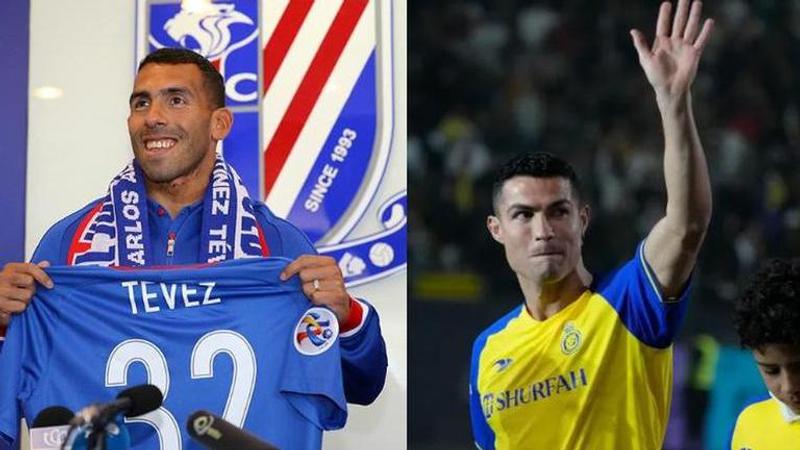Published 13:13 IST, July 11th 2023
Decoding decline of Chinese Super League and what Saudi Pro League can learn from it
After dominating the football market for much of the previous decade, the Chinese Super League may have left to give the Saudi Pro League room to grow.

The Saudi Pro League has made its entry into the European transfer market with a boom after signing former Real Madrid and Manchester United star, Cristiano Ronaldo in January. Since then it has gone on to sign the top European players after paying them a hefty amount of money to wear their club’s jersey in the Middle East with a project to make Saudi Arabian football to be one of the best in the world and compete with European top leagues. However, there was a time in the mid-2010s when the Chinese Super League did a similar thing by entering the transfer market of Europe’s top leagues snatching talented footballers from big clubs in order to develop their league.
3 things you need to know
- China was once a superpower like Saudi Arabia in the football market
- Chinese Super League failed after the Covid-19 pandemic
- Saudi Arabia eye to compete with Europe’s top 5 leagues
What went wrong with the Chinese Super League
(Oscar signed for SH SIPG in the Chinese Super League from Chelsea for €60.00m in 2016/17, Image-AP)
Prior to Saudi Arabia's recent spike in league spending, China had positioned itself as a growing Asian superpower from season 2015/16, spurred by President Xi Jinping's aim of developing the country into a footballing force by 2050. With this goal in mind, a number of firms, notably those in the real estate sector, began investing in the sport. As a result, the Chinese Super League (CSL) signed high-profile players such as Oscar from Chelsea, Hulk from Brazil, Paulinho from FC Barcelona, and Jackson Martinez from Atletico Madrid, all of which were unusual for Asian clubs at the time.
This result, however, was fleeting. The financial difficulties caused by the COVID-19 epidemic proved to be insurmountable for both the CSL and the country. Jiangsu FC fell out of business in 2021 when its owners withdrew their backing. Another major setback occurred in December 2022, when Guangzhou FC, a team with eight Chinese titles and two Asian Champions League crowns, was demoted.
Although the pandemic had a significant impact in the CSL's decline, the league's demise had already begun before COVID-19 seized the world. It was the final nail in the coffin for a football league that had once posed a substantial threat to both Asian and global markets.
Chinese clubs were ready to spend a lavish amount of money to bring Europe’s most decorated footballers like Didier Drogba and Carlos Tevez. According to the reports, the 2016-17 transfer window of winter recorded spending $400 million which at that time was one of the biggest transfer windows of all time. Players like Oscar and Hulk were paid way more than £200,000 whereas former PSG star Ezequiel Lavezzi was being paid £798,000 per week at Hebei China. The Chinese government was ultimately compelled to impose a pay ceiling on international signings in 2021.
The clubs were getting into huge debts to pay huge amounts to these stars and after the Covid pandemic led to lockdown the players had to play in empty stadiums which led to a huge loss of the league and the clubs as one of the biggest sources of generating money was affected.
However, after the stadiums were allowed to gather fans, people were not ready to risk their lives to attend a match in a crowded area which also led to a generation of less income after the Covid pandemic. However, after 3 and a half years, the league eyes to regain its shine but it's still a long way to go after Saudi Arabia enters the market this year.
What can Saudi Arabia learn from the Chinese Super League’s failure?
The summer transfer window has witnessed the likes of Karim Benzema and N'Golo Kante moving to Al-Ittihad on free transfers with lucrative wages after Cristiano Ronaldo joined in January. Furthermore, Steven Gerrard's appointment as a manager in the Saudi Pro League is a notable addition, with more expected to follow suit.
Saudi Arabia, in the opinion of football agent Cardoso, may learn from China's failures. He draws attention to wealthy clubs like PSG and Manchester City while emphasising the value of strategic planning in addition to financial resources. He uses Manchester City's success as an illustration of Middle Eastern ownership that is prepared to put money into their business and work hard to see results as they recently won the UEFA Champions League, Premier League and FA Cup in the 2022-23 season. The significance of the wise decisions taken by new owners is highlighted by Newcastle's recent metamorphosis from relegation hopefuls to a Champions League team, under the ownership of the Saudi Public Investment Fund.
Saudi Arabia's strategy, if correctly implemented, has the potential to be a game-changer, even though China offers a cautionary example, demonstrating that money alone does not ensure success. More elite European athletes are probably going to think about joining Saudi clubs because of their financial clout. The Saudi Pro League's impressive start lays a good foundation for further advancements since the Middle East is already emerging as a significant power in football.
Updated 13:11 IST, July 11th 2023





